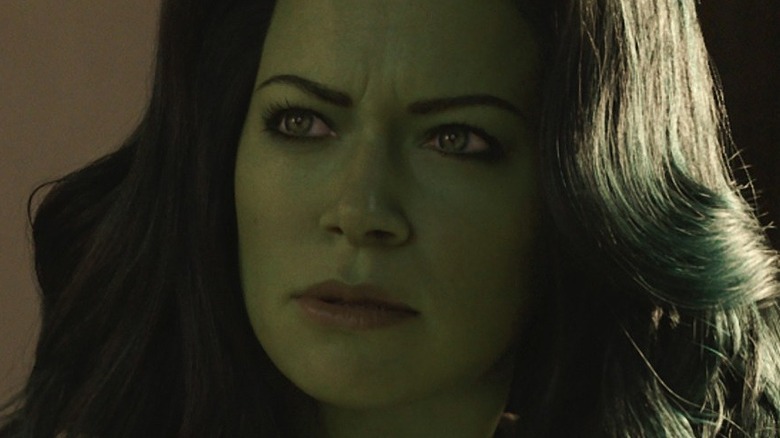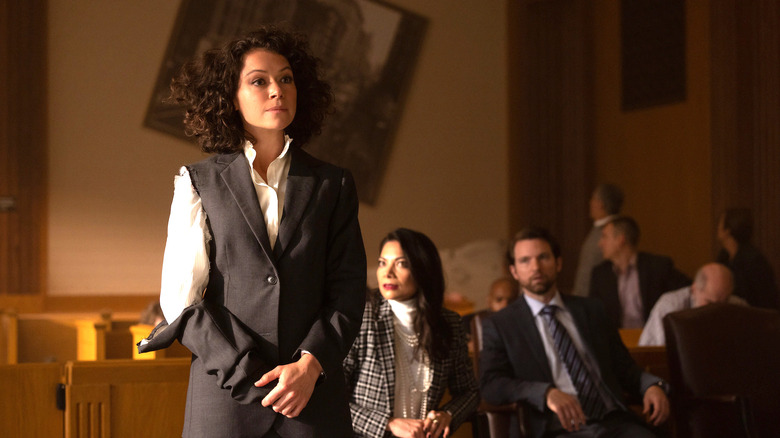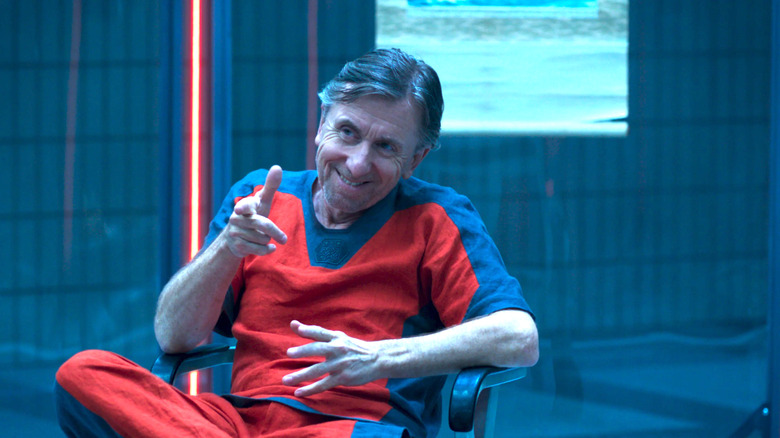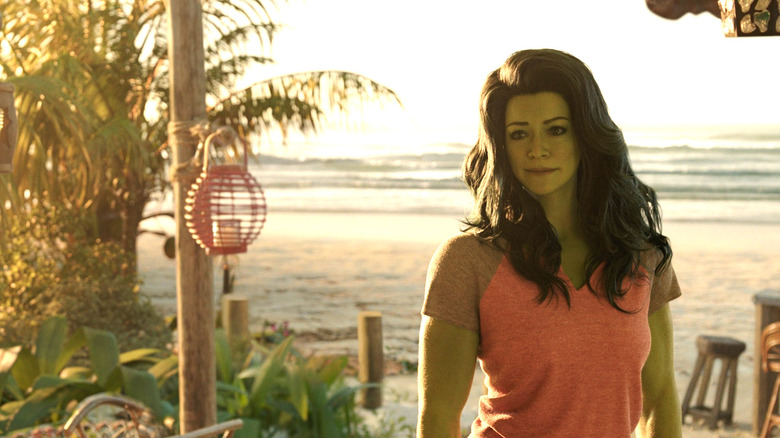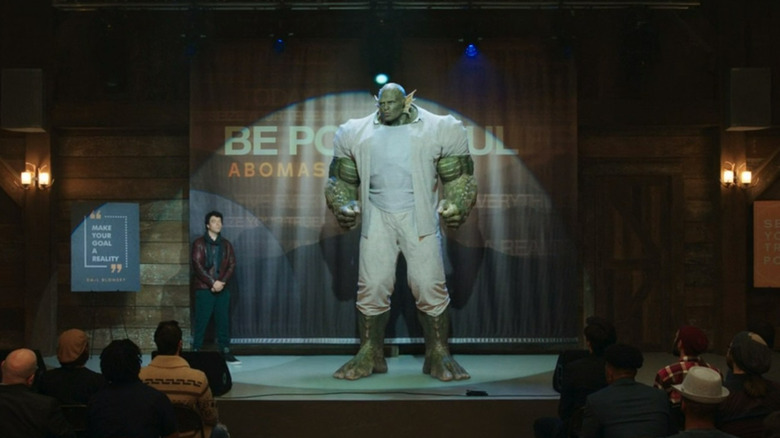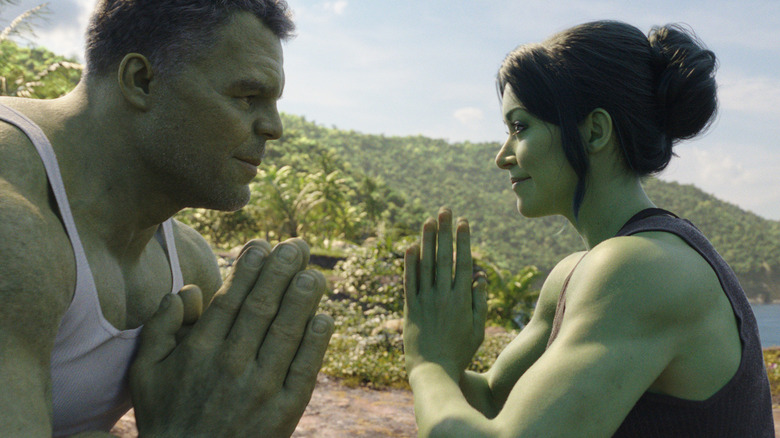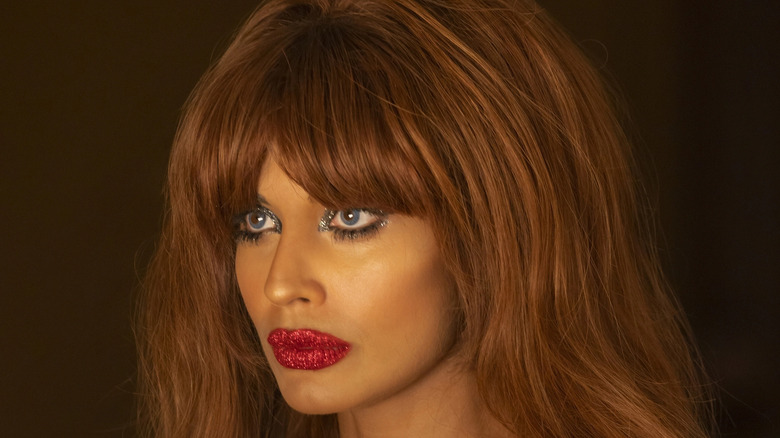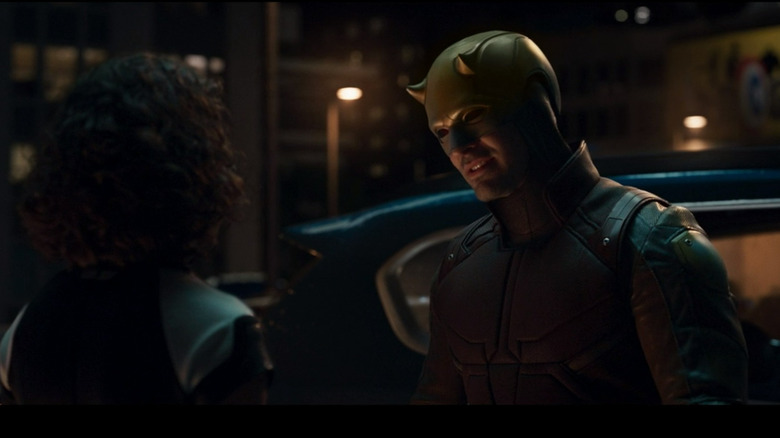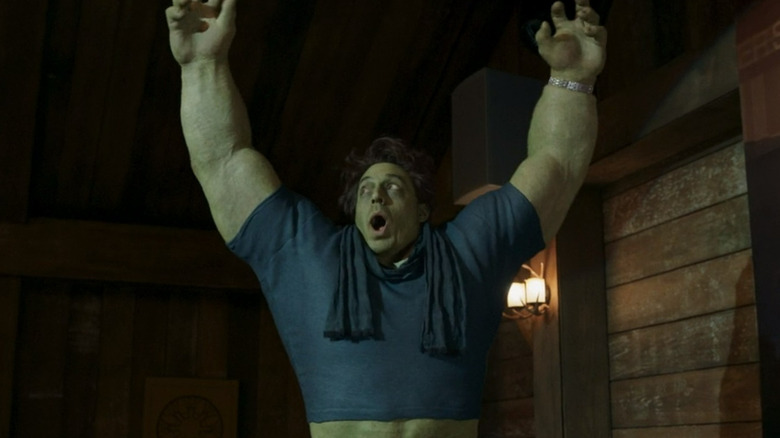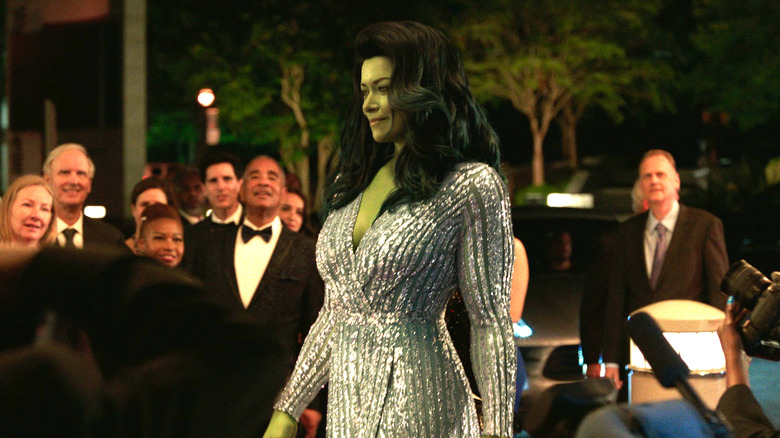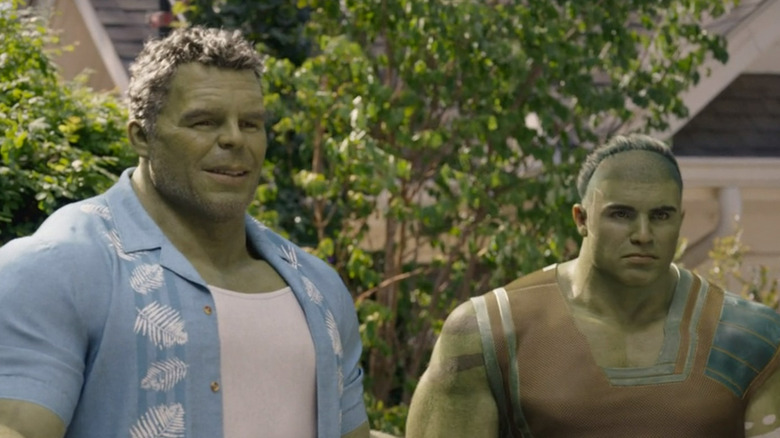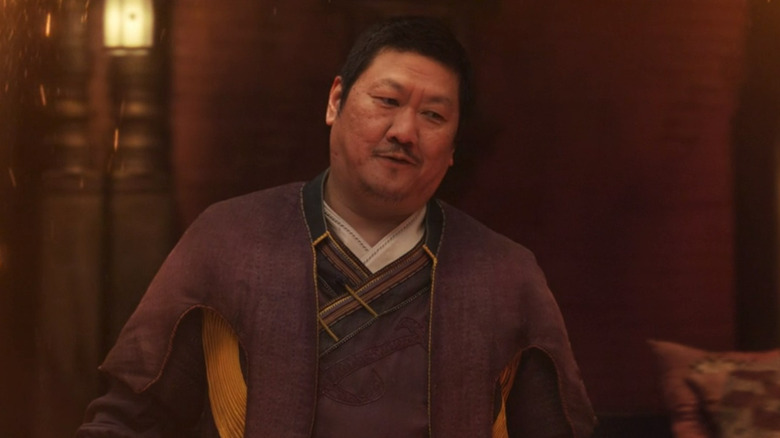The Ending Of She-Hulk: Attorney At Law Explained
With the Disney+ original series "She-Hulk: Attorney at Law," the Marvel Cinematic Universe ventures into the sitcom space — not as a metaphor like in "WandaVision," but as a joke-filled exploration of the form and the entire MCU. Not only is it one of the funniest entries in the franchise to date, but it also provides poignant and relevant commentary on modern-day fandom. Most importantly, though, it's a story about claiming your own identity and refusing to let others control your story.
Those sound like pretty lofty goals for a comedy show about a woman who can transform into a green giant, but "She-Hulk" pulls it off. However, since essentially every episode stands on its own (with connective tissue throughout), it can be a little difficult to see the show as one cohesive narrative. So let's break down the major themes, characters, and plot elements of "She-Hulk" in an effort to step outside each individual episode and take in the season as a whole. Without further ado, here's everything you need to understand about the ending of "She-Hulk: Attorney at Law." Be warned, there will be major spoilers ahead.
This is a lawyer show
From the beginning of "She-Hulk," Jennifer Walters (Tatiana Maslany) wants us to know that this isn't a superhero show — it's a lawyer show. The first episode shows her in her element, practicing closing arguments in her office before heading to court. Since she knows the majority of us watch MCU movies for the heroics of larger-than-life characters, she turns to the camera and agrees to tell us her secret origin just to get it out of the way.
After we learn about the car accident with her cousin Bruce and his blood accidentally falling into her wound (as opposed to the mind-boggling blood transfusion Bruce intentionally gives her in the comics) and Bruce fails to train her, Jennifer enthusiastically exclaims that this is now a lawyer show. Then, Titania (Jameela Jamil) bursts through the wall and forces Jen to Hulk-Out, revealing her secret to the world.
In a lot of ways, that is what the show is about: Jennifer Walters' refusal to be a superhero and determination to just be a really good lawyer. This idea comes back in various forms throughout the series, but the finale really hits it home when she flat-out delivers a closing argument defending her right to want her show to be something new and different in the MCU. In this way, the series basically serves as an argument as to why new and different kinds of stories can and should exist within the superhero space.
Second chances
Another important theme moving through "She-Hulk" is that of second chances. The most obvious example of this is the character of Emil Blonsky (Tim Roth), who's Jennifer's first client once she gets the job at the law offices of GLK&H. The character was first introduced to the MCU in 2008's "The Incredible Hulk," in which he signs up to receive the super soldier serum in order to take down Bruce Banner. In that film, he's clearly depicted as the villain, but in "She-Hulk: Attorney at Law," he argues that he was the victim of a botched experiment carried out by the American government, and that he's changed.
Both the audience and Jennifer are suspicious of Emil, but Bruce assures everyone that they've buried the hatchet and that he too is a different man now. Yes, this is an obvious reference to the fact that the Hulk was played by Edward Norton in the '08 film, but it's also a statement on how people can change over time. Aside from the various antagonists who get second chances, Jennifer has to learn to give her new identity a second chance as well, which we see in the scene where Matt Murdoch explains that she has the incredible opportunity to help people both in the courtroom and in the real world.
Not just a female Hulk
When Jennifer is infected by Bruce's blood, it throws a wrench into her entire life. She had her own career and her own life that she was fairly happy with, and now she's forced to live with a power that she wants nothing to do with. That's nothing new in superhero stories, but for her, it's sort of a double curse. Not only can she no longer live her normal life, but everyone insists on comparing her to her cousin.
The minute she reveals herself in court to stop Titania from hurting people, Jennifer obliterates her anonymity. To make matters worse, her identity quickly gets co-opted by the media, who claim her to be nothing more than the "female" version of her cousin. By the end of the series, Jennifer is so fed up with everyone comparing her to Bruce that she literally rewrites the ending. Everything's in place to have Bruce and Jennifer fight King Hulk side by side, but that would only further the misconception that she's just a lady Hulk. So she shuts that down and basically says, "We will not have this show devolve into typical Marvel third-act shenanigans." Why? Because she's her own person.
A lack of Intelligencia
The villain of "She-Hulk" isn't someone you can just haul off and punch in the face several times. Like the version of the Mandarin we got at the end of "Iron Man 3," She-Hulk's nemesis is more of a concept than it is a specific individual. Although, there is someone at the center of that concept who's primarily responsible for all the horrible things that happen to her. Therefore, you can't just end the show with the typical Marvel movie fight scene.
Intelligencia is a website frequented by a bunch of insecure misogynists who can't stand the fact that a woman got cool superpowers and they didn't. A lot like certain groups on the actual internet, they complain erroneously about being victims, claiming that She-Hulk is strutting around with abilities that she doesn't deserve. They feel betrayed and disenfranchised by the fact that a woman is given the kind of thing they feel they deserve, and they take out that anger by shaming her online and threatening to kill her.
As evidenced perfectly by the sexist vitriol that's been leveraged at the show by a subset of viewers since its announcement, this kind of response is far from fantasy. From start to finish, the series makes a point of showing the real-world trends that allow groups like Intelligencia to flourish.
Jennifer vs. She-Hulk
Bruce Banner had to struggle for years to find peace with his alter ego. Through his dialogue in "She-Hulk: Attorney at Law," we learn that for him, the Hulk truly is another being living inside him. After merging with that being, Bruce is finally able to find solace. He tries to help Jennifer do the same, but she doesn't really need his help.
As she points out in the series, fear and rage are constant emotions for her because of the everyday struggles of being a woman. People are always ready to knock her down, take advantage of her, or just assume they know more than she does. Since she's spent her entire life coming to grips with that, she doesn't need the same training to control her moods that Bruce does. Instead, her struggle is in accepting the fact that she can transform at all.
Again, once she changes, she becomes a public figure. And when you're a public figure, the millions of strangers who know your name and image decide who and what you are. Jennifer argues over and over again that she isn't She-Hulk — she's just Jennifer Walters. Only when she's able to embrace her new public persona (thanks to a little advice from Daredevil) can she finally stride into the courthouse at the end with real confidence — even though the media immediately accuses her of being a diva.
Titania the phony
Titania is set up as the villain of the series pretty early on when she smashes through the wall of the courtroom before Jen can deliver her closing argument and win the case. Their fight is the inciting incident of the entire series because that action results in Jen revealing her green self to the world and the morons who post on Intelligencia to rally together to take her down.
Then she disappears for a while. When she shows back up, she has trademarked the name She-Hulk, making us think that she has some diabolical plan to take She-Hulk down in a public forum, but that doesn't happen either. Finally, they meet again in the flesh at a wedding for Jen's high school friend, but the fight doesn't quite go the way we expect either.
Then, just before the climax of the series pops off, she shows up to throw down with everyone else — but the show takes a drastic left turn. By the end, she's just another person standing around with nothing to do. While Titania could be plotting something else, the fact of the matter is that she's a nobody. She's a person who learned how to manipulate public interest into making a profit by flaunting her wealth, her image, and selling people bottles filled with nothing. She is, basically, who the Intelligencia posters think She-Hulk is, but they couldn't be more wrong.
Jen meets the Devil
Jennifer Walters' love life is an absolute disaster. She's too busy for relationships, and once she becomes She-Hulk, men are more interested in her green form than her human form. She thinks men don't want the "real" her — they just want the idealized version of her. Still, she decides to use that to her advantage and sets up some dates.
The first guy she takes home is nice enough at first, but once he sees her human form, he loses interest in her. The second is a certifiable monster who films himself having sex with jen without permission, takes photos of her while she's sleeping, and then steals all the information on her phone. So, by the time she meets a blind lawyer named Matt Murdock from Hell's Kitchen, AKA Daredevil (Charlie Cox), she's pretty done with relationships for the time being.
However, Matt manages to see her more clearly than anyone else. He's uniquely suited to understand her struggle because he's also living a double life, so he gets a bit of what she's going through. In addition to their romantic connection, he helps her understand that there is a way to use her double life to help people so she never has to give up who she is. That's probably why she's so happy with him at the end.
Hulk King
If "She-Hulk" has a singular villain, then it's the loser named Todd Phelps (Jon Bass) who dubs himself "Hulk King." At first, he's just one of many dates Jen goes on, and while his personality is comical, there's something unsettling about the way he speaks and carries himself.
Things take a turn later when he reveals himself to be the guy behind Intelligencia, and that he set up Josh to infiltrate Jen's life and wreck it. He doesn't see her as a human being. As far as he's concerned, she's a giant, green reminder of everything he's not. He's not confident. He's not powerful. He's a petty, childish, and dangerous sexist who assumes he's destined for greatness and can't bear the fact that a woman has powers she didn't even want.
That's why he tries to dismantle her life and take her blood — he wants to be the Hulk. It's fine to criticize derivative heroes when they're women, but when they're men Todd thinks that's fine, apparently. We expect there to be a big throwdown when he Hulks out, but Jennifer pulls a twist and just changes the trajectory of the episode. Honestly, Todd doesn't deserve the dignity of fighting She-Hulk anyway. It's much more fitting that she simply takes his power away from him.
Controlling the narrative
The ending of "She-Hulk" is certainly strange, but it makes perfect sense for the show. This is a character who's trying to be one thing, but everyone else wants her to be something else. She doesn't want to be a superhero, but Bruce tries to make her one. She doesn't want to go public, but Titania screws that up. She wants to be respected as a lawyer, but her boss and the media are determined to make her a freak show.
At a gala where Jen shares a ridiculous award with other women, Intelligencia publically shames her for having a sex life — something she obviously has no business being ashamed of. When the narrative of the series turns into a big punch-fest, she can't take it anymore and literally steps outside her show to confront Kevin Feige himself (in A.I. form). Through this bizarre twist, Jen takes back the narrative of her own series and her life in general.
She's been the pawn in other people's stories for too long, and she decides to take back what's hers. This is a woman who's done nothing wrong, but who continues to be tormented by outside forces. Can you blame her for refusing to let her show fall into typical Marvel cliches? Some viewers might find the ending so unconventional that it puts them off the show, but after considering all of the show's meta-commentary, it's an oddly perfect way to wrap things up.
The Hulk's Skaar
"She-Hulk: Attorney at Law" wouldn't be a proper MCU show if it didn't spend some time setting up future stories, which is what happens at the tail end of the "She-Hulk" finale. After Jen re-writes the episode and makes sure that everyone gets some kind of arc, she winds up back home with her parents for a celebratory barbeque. Of course, they want to know everything about her life and especially her new beau Matt.
As everyone sits down to their meal, Bruce shows up in his Hulk form and apologizes for being away on Sakaar for so long, promising to let us know all about it in the future. This hints that there could be a Hulk movie or series in the future that would explain what was going on on Sakaar. The show even gives us a little tease as to what happened there when Bruce introduces his son Skaar (Wil Deusner).
The character of Skaar first appears in the comics' "World War Hulk" storyline, where he's born to the Hulk and his wife Caiera on Sakaar. Skaar ages quickly — possibly due to the strange and violent circumstances of his birth — and becomes an adult in no time, just as he appears in "She-Hulk." His presence in the show suggests that the next Bruce Banner story we get might be an MCU approximation of that same storyline.
Sucked into another show
It's a bit confusing at first when to see Emil Blonsky locked up in "She-Hulk: Attorney at Law," given that the last place we saw him was fighting Wong in a cage in "Shang-Chi and the Legend of the Ten Rings." The series explains that Wong broke Emil out in order to have someone to spar with, but that Emil returned to his cell to serve out his sentence afterward like the reformed man he is.
At the end of the "She-Hulk" finale, we see Emil locked up yet again, this time for violating his parole by transforming into the Abomination. Wong then shows up to break him out again. It seems like Wong might need him to spar some more, but Emil brings his clothing with him as if he has no intention of returning. Also, he asks about the amenities he'll have access to at Kamar-Taj, suggesting he may even start to learn some sorcery.
When Wong arrives this time, Emil asks him if he's been "sucked into another show." We know that Wong likes to watch television (he's working through "The Sopranos" earlier in the season), so he might have gotten "sucked" into a new television series to watch. Or maybe this is the rare example of a character other than Jen breaking the fourth wall, hinting at the idea that Wong could appear in another MCU show in the near future. For now, that's one of the big unanswered questions in "She-Hulk."
